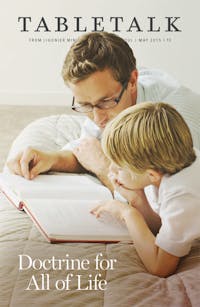
Request your free, three-month trial to Tabletalk magazine. You’ll receive the print issue monthly and gain immediate digital access to decades of archives. This trial is risk-free. No credit card required.
Try Tabletalk NowAlready receive Tabletalk magazine every month?
Verify your email address to gain unlimited access.
I’m not a prophet or the son of a prophet. I’ve made a lot of predictions and guesses about the future that haven’t come true. As I told the congregation of Saint Andrew’s Chapel a few weeks ago during a sermon, I’m not infallible, nor have I ever claimed to be infallible.
On occasion, however, my predictions of the future have been accurate. When you’ve been writing a monthly column for as long as I have, you invariably comment on cultural matters and the direction that the culture is heading. Recently, I was reading a column I wrote twenty-five years ago for the January 1990 issue of Tabletalk, and I was amazed at how prescient it turned out to be.
I wish I could say I’m happy about that. In the column I addressed the specter of a new dark age in our culture. I wasn’t referring to a new dark age in terms of the stunted growth of knowledge. What was true then remains true today: we have more knowledge than we know what to do with. Knowledge in every field of study is growing so rapidly that no one can absorb it all. Scholars must choose increasingly narrow specializations to have hope of gaining expertise, and then it is only expertise in a relative sense. This reality has only grown worse with the advent of the Internet and the way it makes truth—and falsehood—more easily accessible than our forefathers ever dreamed.
The dark age to which I was referring was an age of moral darkness, a darkness due to the eclipse of God. Twenty-five years ago our culture would not have God in its thinking, and the same is true today. As a society, we have preferred for the light to be shrouded. We’ve chosen to close our minds to the truth. And yet, the light remains. Just as a solar eclipse obscures but does not destroy the light, our moral darkness hides but does not eliminate the light. We see the truth of the apostle Paul’s teaching that we suppress the truth in unrighteousness—but we cannot destroy the truth (Rom. 1:18–32). Humanity remains incurably religious, and we retain the innate sense that we must live by a moral code. But on account of our suppression of the truth, this moral code is twisted to reflect the darkness of our own hearts, not the immutable moral law of God.
Futile thinking continues to result from this. Our darkened minds attempt to shroud the truth of our Creator, and we as a society fail to honor Him. This has led to the loss of honor itself, to the sacrifice not only of divine dignity but of human dignity as well.
Twenty-five years ago, I predicted that this eclipse would manifest itself in various cultural struggles such as abortion. Though we have seen the rise of crisis pregnancy centers and bans on partial birth abortion, our culture continues to endorse abortion on demand.
I also predicted that the state would zealously protect its supposed autonomy, interpreting the separation of church and state to mean the separation of the state and God. As I write this column, the state and federal courts of the United States have declared that “homosexual marriage” is a right in the majority of U.S. states, and come June the Supreme Court will rule on whether the Constitution guarantees this right to all U.S. citizens. Since the law is being determined by collective preference and not the revelation of God in the natural order, I have little doubt that the highest court in the land will feel no shame in casting aside God’s definition of marriage in favor of the current spirit of the age. In all this, some churches have already capitulated. They are either silent on these matters of life and human sexuality, or they have bowed to cultural pressure to abandon what God says on these matters.
Yet I do not mean to paint a picture of gloom and doom. There are faithful believers and churches who are not capitulating. God’s kingdom continues to grow around the world. The light of divine truth shines brightly even though at times the darkness seems overwhelming. Our Lord is building His church, and He will not be thwarted (Matt. 16:18). At times it may seem as if the darkness is winning, but God’s Word stands firm. People around the world are hungry for His truth, and by the Lord’s grace, His people are taking it to the nations.
Twenty-five years ago, I predicted that a tremendous struggle was coming. We are living in the midst of it. Such is the plight of the church militant in every generation. The struggle manifests itself in different forms, but it is essentially the same. We are called in our generation to be faithful to the gospel, for the honor of God is at stake. And when the honor of God is at stake, so is the honor of every human being, for it is God who grants dignity to men and women. Our high calling is to remain faithful to the Lord in this struggle, to fight for the truth of God’s Word and not to compromise. If we remain faithful, we are promised a sure and great reward: “The one who conquers will not be hurt by the second death” (Rev. 2:11b).
